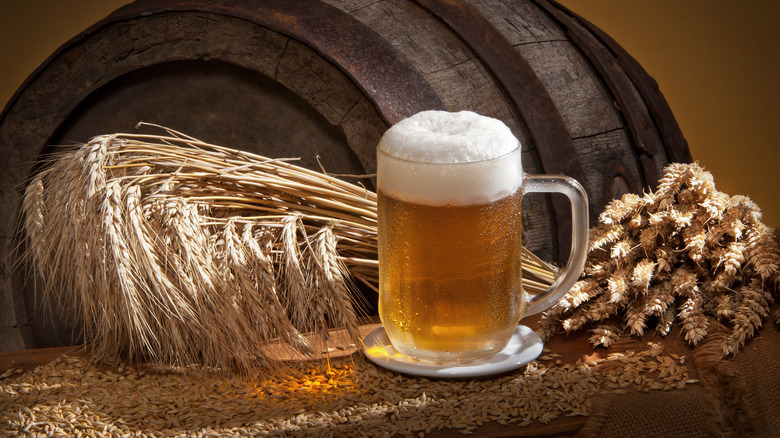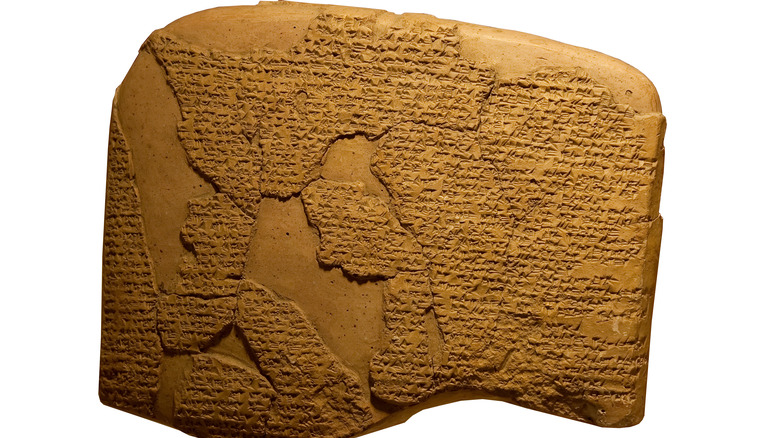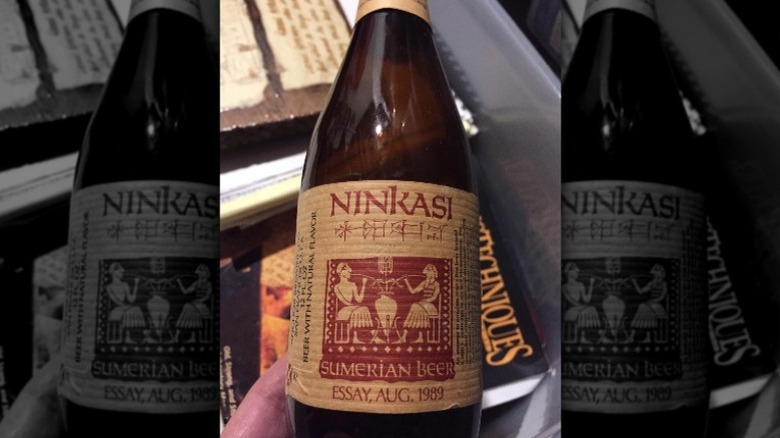This Ancient Drinking Song May Actually Be The First Recipe For Beer
Contemporary pop music is full of drinking songs. Simultaneously, some of the better-known alcohol-inspired ditties, like 99 Bottles of Beer on the Wall, seem incredibly old. However, they're still much younger than the original boozy tunes.
For Punch, author and culinary anthropologist Sarah Baird looks to the past to determine how the Western tradition of drinking songs began. In the 12th century, a group of wandering clergymen came up with a variety of tunes that not only celebrated alcohol but also satirized the powers that be. Throughout medieval times, this musical concept made its way across Europe. Eventually, thanks to singing sailors, it reached the New World, too, where it was sung by industrious pioneers. By the 20th century, such drinking songs changed to lament misfortunes, like heartbreak and loneliness, in a drunken stupor. Drinking songs take many forms indeed.
What better drink to sing about than beer? Innovations from the industrial revolution helped brewing crafts go global, according to Encyclopedia Britannica, but before that, various beer-making techniques were used all throughout Europe in the Middle Ages. Even ancient Roman historians documented that Celts, Germans, Norse, and Saxons consumed ale. However, beer doesn't originate from Europe, nor do the drinking songs that go along with it. For that, one must look further east. The secrets of beer production were discovered in Sumer, the earliest known civilization, located in what is now Iraq. It's there that perhaps the first recipe for beer emerged.
Sumerian brews
Brews were so highly valued in early civilizations that, occasionally, workers were paid in beer rations. At least one archeologist — Patrick McGovern in his book "Uncorking the Past" — has also suggested that the discovery of barley-based beer may even have been a big reason hunter-gatherers first settled down. Beer required some agriculture, and the Fertile Crescent was an ideal place to grow the necessary crops (via Smithsonian Magazine).
The first known recipe for beer is almost 4,000 years old, according to historian Peter Damerow (via Cuneiform Digital Library Journal). In what is now Turkey, Sumerian clay tablets were uncovered, which recorded a hymn to Ninkasi, the goddess of brewing. As Damerow notes, the hymn's repetitive content and form make it clear these lyrics were meant to be sung. The lines not only praise Ninkasi but also describe the brewing process for early beer. Dough is mixed with sweet aromatics, then the bread is oven baked alongside hulled grains. Afterward, malt, honey, and wine get added in before everything ferments in a vat. Finally, the beer is poured out and filtered (via the Electronic Text Corpus of Sumerian Literature).
As explained by World History Encyclopedia, scholars believe this hymn spread by word of mouth during its early existence. While it was likely popular as entertainment, in all likelihood, the song's musical nature also made it an easy method for illiterate brewers to remember the recipe for their beer. Eventually, it was written down for posterity's sake.
Modern recreations
Thanks to archeologists and whoever wrote down the Hymn to Ninkasi, the recipe for primordial beer is, fortunately, not lost to time. In fact, the drink itself has also been resurrected in modern times by Anchor Brewing Company. Using the Hymn of Ninkasi as a guide, the company conducted research, consulted experts, and experimented at length to approximate Sumerian beer. Throughout the process, Anchor Brewing employees were surprised by how many similarities there were between ancient brewing techniques and our own modern production practices. The resulting brew was fittingly named "Ninkasi" after the goddess that inspired it.
What about the song, though? How can we have Ninkasi beer without the tune that ought to accompany it? Unfortunately, while we do know most of the lyrics, we don't have any sort of musical notation to guide us in song. Nonetheless, some such as the YouTube channel Ancient Recitations have attempted to recreate it in a sort of spoken-word manner. If you'd prefer something more modern with actual singing and rocking music, check out Trappist's song, "Hymn to Ninkasi," featuring Tony Foresta (via YouTube). Others have simply taken inspiration from the ancient hymn in name only, like Jon McCaslin's jazzy and instrumental "Hymn to Ninkasi" (also via YouTube). At one point, there was apparently even a Bandcamp musical group called "Hymn to Ninkasi" in Croatia during the 2010s. Now, if only there was a rendition of the Hymn to Ninkasi in the style of Red Solo Cup, too!


